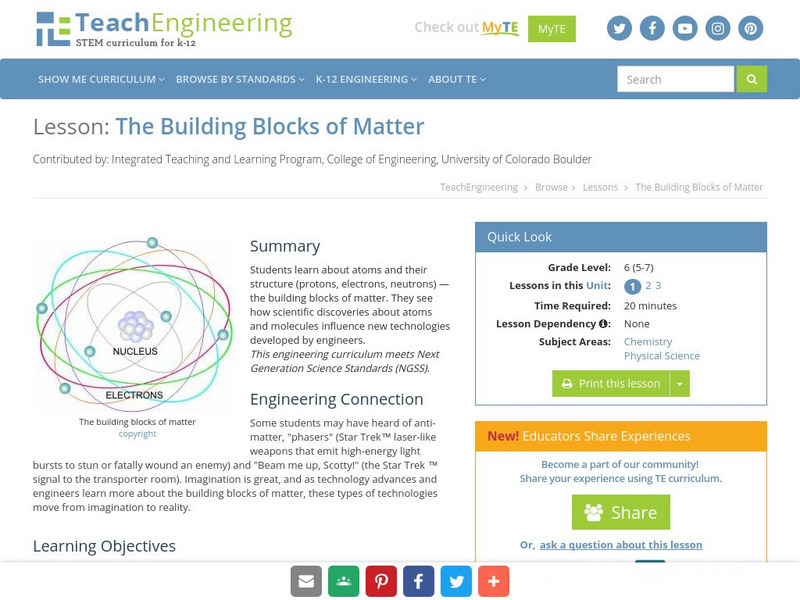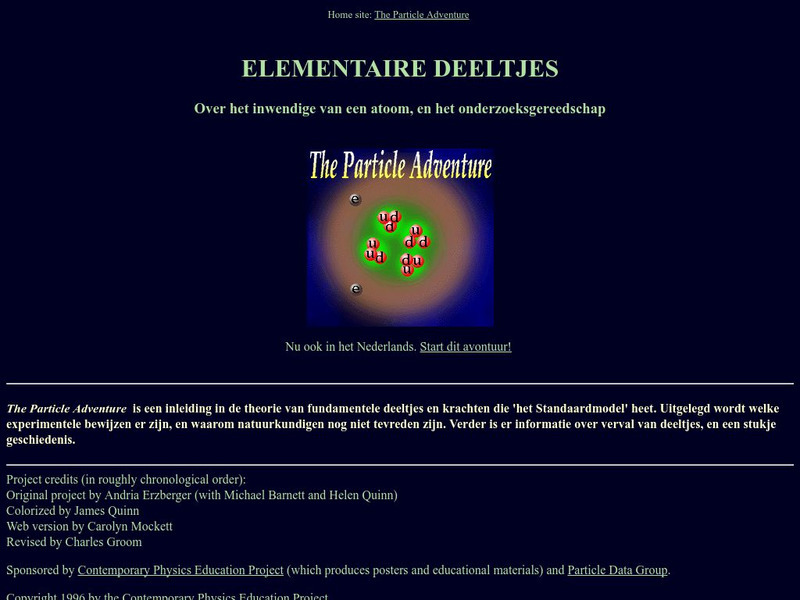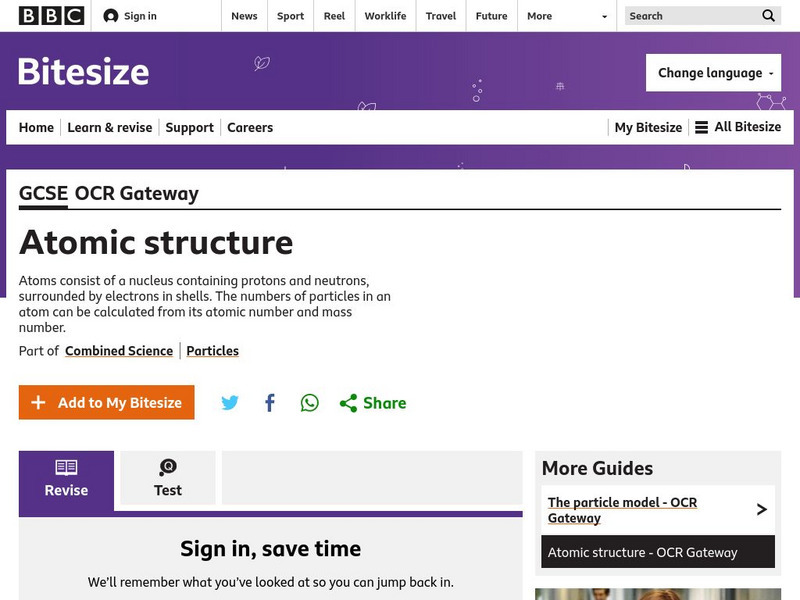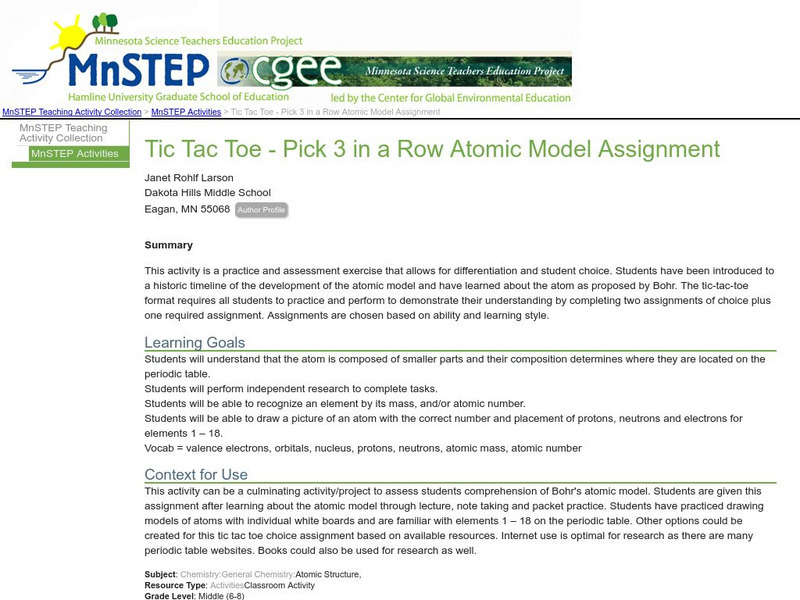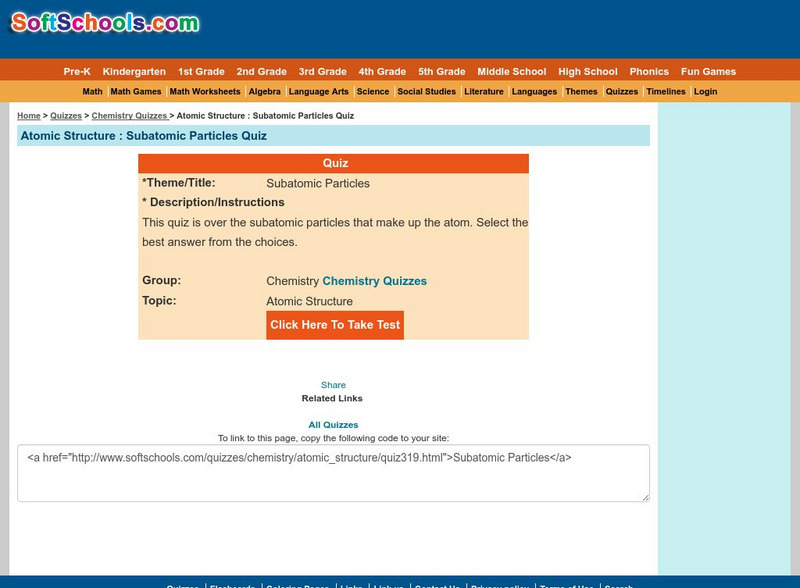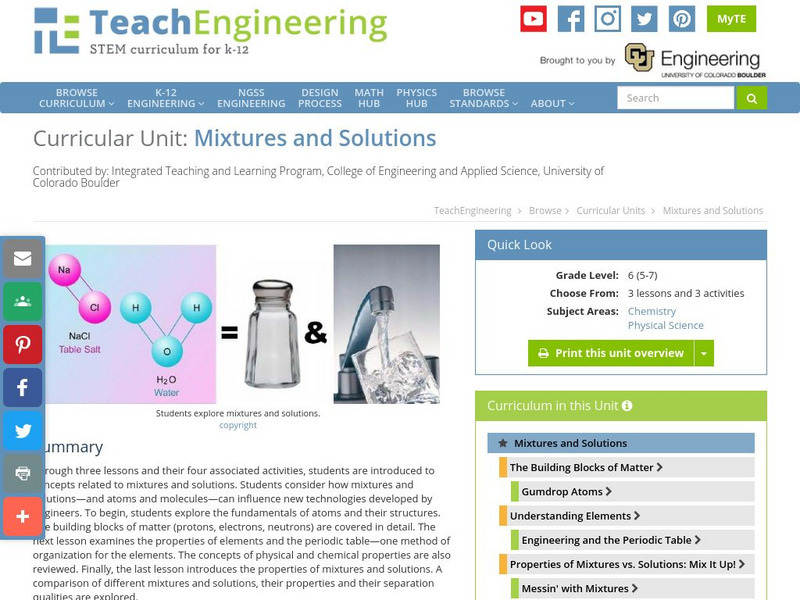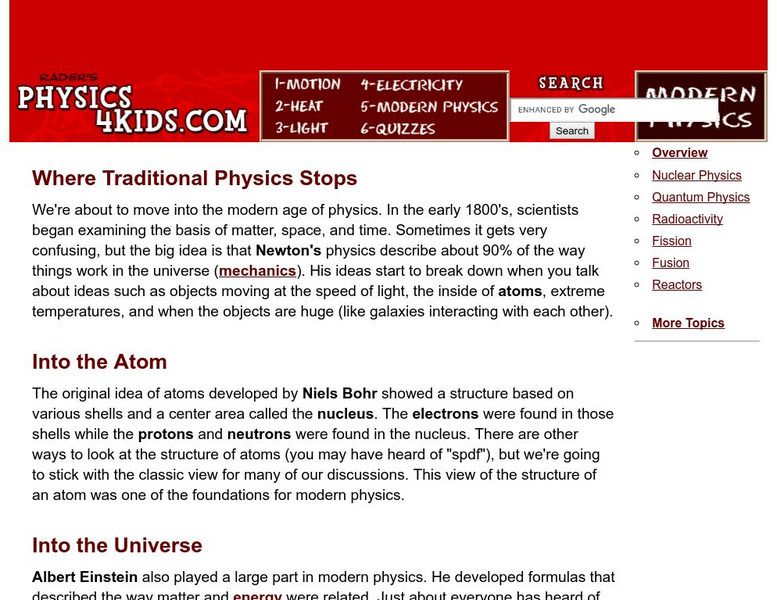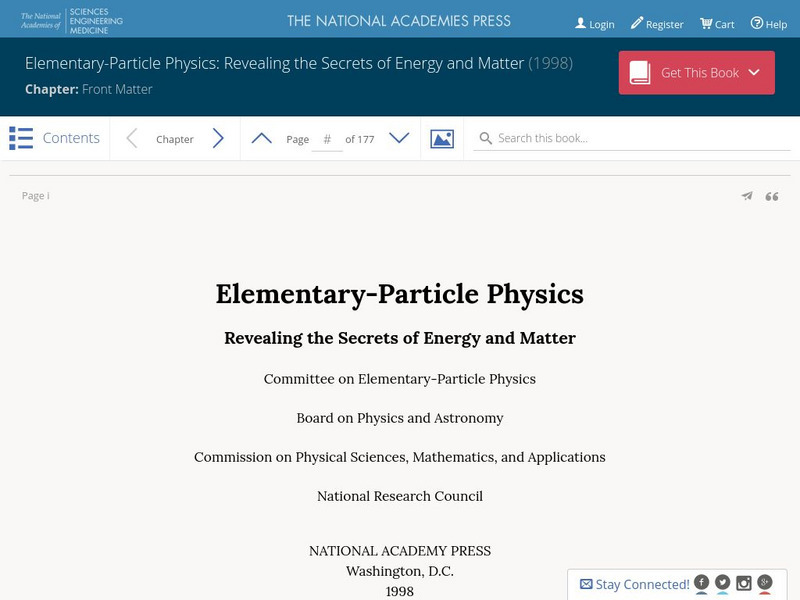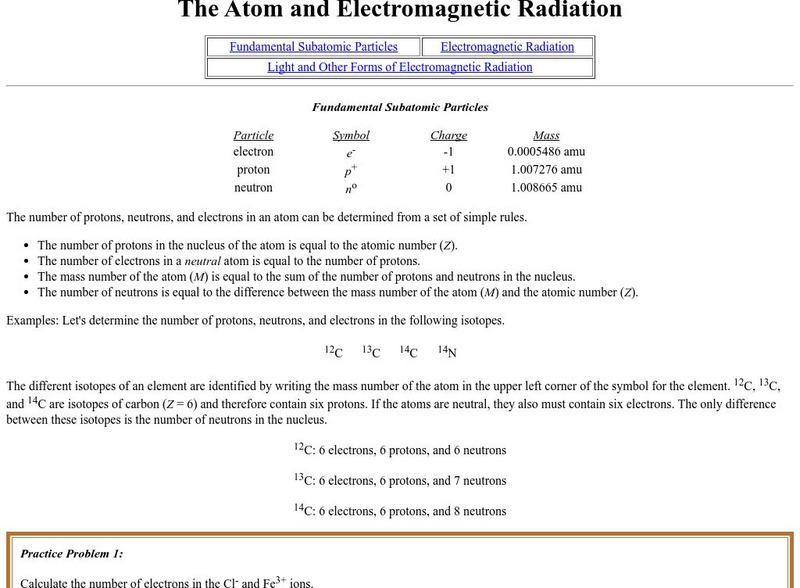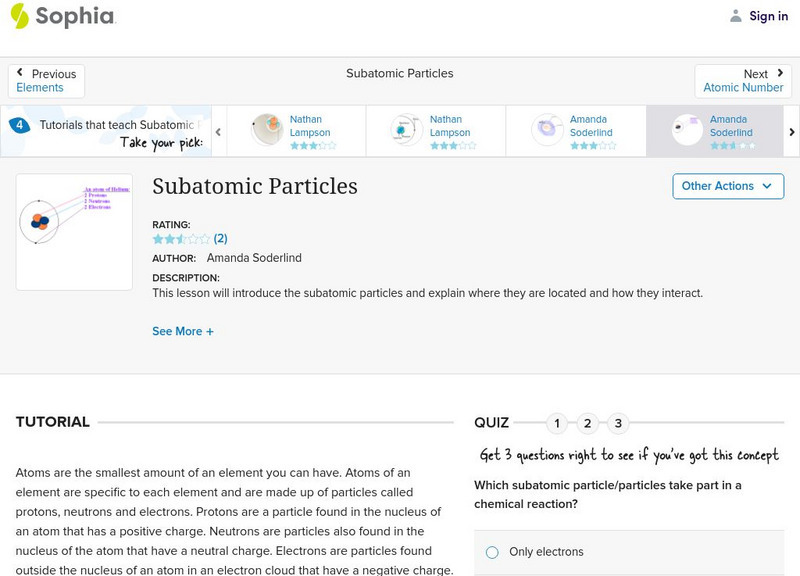Nobel Media AB
The Nobel Prize: The Nobel Prize in Physics 1935 Presentation Speech
The Nobel Physics Chairman made this speech when presenting the Prize to Chadwick. It clearly explains the importance and depth of Chadwick's work. Site by Nobel e-Museum.
Sophia Learning
Sophia: Subatomic Particles: The Neutron: Lesson 2
This lesson will explain that neutrons are particles in the nucleus that have no charge and a mass of one amu. It is 2 of 3 in the series titled "Subatomic Particles: The Neutron."
TeachEngineering
Teach Engineering: The Fundamental Building Blocks of Matter
This lesson plan explores the fundamentals of atoms and their structure. The building blocks of matter (protons, electrons, neutrons) are covered in detail. Students think about how atoms and molecules can influence new technologies...
Other
Particle Adventure Dutch Version
Dutch version of the well-known "Particle Adventure" physics website that teaches students about atoms, mass, particle physics, and quantum physics. The site discusses theories related to physics and provides other links related to the...
BBC
Bbc: Gcse Bitesize: Atomic Structure
This lesson focuses on the structure of atoms. All substances are made from atoms. Each atom is made of a nucleus - containing protons and neutrons - surrounded by electrons. It provides a link to an assessment.
Science Education Resource Center at Carleton College
Serc: Tic Tac Toe Pick 3 in a Row Atomic Model Assignment
A choice menu assignment where students select between several extension activities that help understand the structure of the atom.
Curated OER
Science Kids: Science Images: Basic Atom Structure
This diagram shows a basic atom structure with an atom core, proton, neutron and electron.
Soft Schools
Soft Schools: Subatomic Particles Quiz
Take this interactive, multiple-choice quiz over subatomic particles, then review your score and any missed questions at the end.
PBS
Pbs Learning Media: Atomic Structure
Take a look at the parts of an atom and learn about its properties.
TeachEngineering
Teach Engineering: Mixtures and Solutions
This unit covers introductory concepts of mixtures and solutions. Students think about how mixtures and solutions, and atoms and molecules can influence new technologies developed by engineers. The first lesson explores the fundamentals...
Annenberg Foundation
Annenberg Learner: Interactives: The Periodic Table
An interactive website where students learn about the basics of an atom, periodic tables organization, and the structure and properties of matter. Module includes an introduction and five lessons that are followed by a quiz and an...
Department of Defense
Do Dea: Chemistry Review
Review atoms with this slideshow. You can choose to listen to the review or read the accompanying text. At the end, play the game to review the basics of atoms that you have just learned about. You may play the game as many times as...
American Chemical Society
Middle School Chemistry: Periodic Table
Students explore the periodic table and learn the basic information given for elements: the name, symbol, atomic number, and atomic mass for each element.
Physics4kids
Physics 4 Kids: Where Traditional Physics Stops
We're about to move into the modern age of physics. In the early 1800's, scientists began examining the basis of matter, space, and time. Sometimes it gets very confusing, but the big idea is that Newton's physics describe about 90% of...
Concord Consortium
Concord Consortium: How Does an Object Become Charged?
Activity 1 in this module: What is the effect of changing the composition of an atom? Since all atoms contain protons, neutrons, and electrons, what makes one element different from another is examined.
American Chemical Society
American Chemical Society: Hompage
ChemCenter, available from the American Chemical Society, provides chemistry news, reference sources and other public services.
Thomas Jefferson National Accelerator Facility
Jefferson Lab: It's Elemental: Element Math Game
The interactive activity examines the Periodic Table of Elements. Learners answer questions about the number of protons, electrons, neutrons, or nucleons that an atom of an element contains.
Other
National Research Council: Elementary Particle Physics
The Committee on Elementary-Particle Physics, part of the U.S. National Research Council, presents this massive report on particle physics. It's a definitive document. Surprisingly readable, totally detailed. Start with the Table of...
Purdue University
Purdue University: Fundamental Subatomic Particles
At this site from the Purdue University, the elementary subatomic particles are described and electromagnetic radiation is detailed. Includes learning exercises and answers.
Lawrence Berkeley National Laboratory
Berkeley Lab: La Aventura De Las Particulas
Learn the fundamentals of particles and forces with this site. Explore the paths that explain matter in the universe.
Sophia Learning
Sophia: Subatomic Particles: Lesson 2
Describe the $ifference between the subatomic particles, including their masses, locations, and charges. This lesson is 2 of 7 in the series titled "Subatomic Particles."
Sophia Learning
Sophia: Subatomic Particles: Lesson 3
This lesson will introduce the subatomic particles and explain where they are located and how they interact. It is 3 of 7 in the series titled "Subatomic Particles."
Sophia Learning
Sophia: Subatomic Particles: Lesson 4
This lesson will introduce the subatomic particles and explain where they are located and how they interact. It is 4 of 7 in the series titled "Subatomic Particles."
Sophia Learning
Sophia: Subatomic Particles: Lesson 6
This lesson will introduce the subatomic particles and explain where they are located and how they interact. It is 6 of 7 in the series titled "Subatomic Particles."


